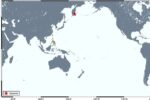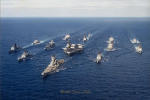PH-US defense pacts important –DND,DFA

Foreign Affairs Secretary Teodoro Locsin Jr. and US Secretary of State Antony Blinken face members of the US media following their bilateral meeting in Washington D.C. DFA handout
The Philippines seeks stronger bilateral ties with the United States highlighting the importance of defense treaties between the two countries and boost its defense capacity.
Both Foreign Affairs Secretary Teodoro Locsin Jr. and US Secretary of State Antony Blinken agreed to hold a Bilateral Strategic Dialogue in November and the “2 Plus 2 Ministerial Dialogue” by next year.
The Bilateral Strategic Dialogue aims to discuss the two countries’ “regional and global issues, and discussion on political, security, and economic cooperation,” among others. While the 2 Plus 2 Ministerial Dialogue is a meeting between the foreign and defense officials of Washington and Manila, DFA said.
“We want to ramp up our bilateral engagement to ensure that our alliance remains strong and resilient,” said Locsin said during a meeting with Blinken in Washington D.C.
Locsin together with other Philippine officials traveled to the US capital to mark the 75th anniversary of diplomatic ties between the 2 countries and the 70th anniversary of the Mutual Defense Treaty (MDT).
The defense pact proves more important now amid rising tensions in the resource-rich and disputed South China Sea, where the West Philippine Sea, the country’s exclusive economic zone within the waters, is located.
The West Philippine Sea is the country’s exclusive economic zone in the international waterways, a huge part of which is being claimed by China despite a UN-backed ruling invalidating it.
China’s maritime militia has been spotted in several areas of the Philippine waters, prompting the DFA to file several diplomatic protests.
“They also discussed ways forward in strengthening the defense capabilities of the Philippines,” it read.
Meanwhile, National Defense Secretary Delfin Lorenzana and US Secretary of Defense Lloyd Austin III have reaffirmed Manila and Washington’s defense commitments.
The officials also discussed Chinese aggression in the South China Sea, which was why Austin emphasized his government’s commitment to the country under the MDT.
Under the treaty, the two sides are obligated to come to each other’s aid in case of external aggression.
“Both sides reaffirmed that the engagement is not just a fulfillment of obligations under the MDT, but a willing commitment to keep the alliance ironclad,” the DND statement said.
Austin also expressed his gratitude to Philippine authorities after President Rodrigo Duterte recalled the abrogation of the Visiting Forces Agreement (VFA).
VFA supposedly “signals a commitment by both sides to strengthen the longstanding alliance.”
The VFA provides rules for the rotation of thousands of US troops in and out of the Philippines for war drills and exercises. It has assumed additional importance as the United States and its allies contend with an increasingly assertive China.
Earlier, President Duterte ordered it abrogated over the US cancellation of the US visa of his close ally Sen. Ronald Dela Rosa. He suspended enforcement of the cancellation several times until finally fully restoring the treaty in July.
Lorenzana and Austin also reportedly touched on regional issues and other problems, while also coming to terms on the best approach to address them.
“Secretary Lorenzana mentioned that both sides now have a better appreciation of each country’s defense and security priorities, and have come to an understanding of shared goals for the alliance and the region,” the statement read.
The two also committed to convene the BSD to “further discuss shared priorities for the alliance, and encouraged their respective armed forces” to maintain collaboration under the Mutual Defense Board-Security Engagement Board (MDB-SEB).
“Both sides agreed to work on a bilateral maritime framework that advances cooperation in the maritime domain, and to resume projects in approved Enhanced Defense Cooperation Agreement (EDCA) locations in the Philippines.”
The United States has repeated a warning to China that an attack on Philippine forces in the South China Sea would trigger the 1951 Mutual Defense Treaty.






